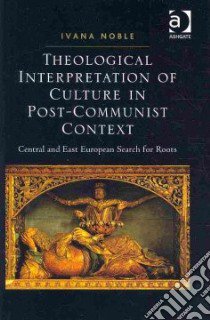Theological Interpretation of Culture in Post-communist Context - 9781409400073
Un libro in lingua di Ivana Noble edito da Ashgate Pub Co, 2010
- € 97.50
- Il prezzo è variabile in funzione del cambio della valuta d’origine
Ivana Noble has written a sensitive and powerful book, courageous in its honest pathos for bumanity and inspiring with its bumble confidence. In these pages the soul of Central-Eastern Europe comes to life as this talented theologian graces us with knowledge of how religious symbols and meaning cultivate the human search for meaning under the ambivalent surfaces of life, in once aggressive but now post-secular societies. Noble offers us in the West an encounter with the Other that cannot but give much food for thought about religion in our own increasingly post-institutional religious situations. Original not only in content but also methodology, her text promises mumerous insights for political theology, liturgical studies, theological aesthetics, indeed, for all seeking to construct theologies at once fundamental and practical in this postmodern age. Bruce T. Morrill, S.J. Thcology Department, Boston College, USA
Twenty years after the fall of Communism in Central and East Europe is an occasion to reevaluate the cultural and theological contribution from that region to the secularization---post-secularization debate.
Czech theologian Ivana Noble develops a Trinitarian theology through a close dialogue with literature, music and film, which formed not only alternatives to totalitarian ideologies, but also followed the loss and reappearance of belief in God. Noble explains that, by listening to the artists, the churches and theologians can deal with questions about the nature of the world, memory and ultimate fulfilment in a more nuanced way. Then, as partakers in the search undertaken by their secular and post-secular contemporaries, theologians can penetrate a new depth of meaning, sending out shoots from the stump of Christian symbolism. Drawing on the rich cultures of Central and East Europe and both western and eastern theological traditions, this book presents a theological reading of contemporary culture which is important not just for post-Communist countries but for all who are engaged in the debate on the boundaries between theology, politics and arts.
Informazioni bibliografiche
- Titolo del Libro in lingua: Theological Interpretation of Culture in Post-communist Context
- Sottotitolo: Central and East European Search for Roots
- Lingua: English
- Autore: Ivana Noble
- Editore: Ashgate Pub Co
- Collana: (Hardcover)
- Data di Pubblicazione: 15 Gennaio '10
- Genere: RELIGION
- Argomenti : Christianity and culture Europe, Eastern Christianity and the arts Europe, Eastern Theology, Doctrinal Europe, Eastern
- Pagine: 230
- ISBN-10: 1409400077
- EAN-13: 9781409400073


